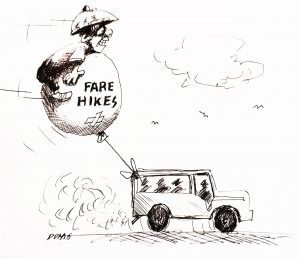Amid the simultaneous price hikes of basic necessities, fares for passenger vehicles also soared higher than they were before, making life harder for the daily commuters on account of their day-to-day routines.
As the public transport operators and drivers would have it, it’s the big increases in oil prices that triggered their demands for fare hikes. It’s the culprit, actually, that explains why the prices of other services and commodities had soared high. Fuel prices dictate the cost of other essentials to human existence.
But while this argument of transport operators and drivers makes sense, there seems to be a problem with their hike demands. First, they ask for a fixed amount for the fares based on distances. This is quite inappropriate because the prices of oil, which they blame on their demands, are not fixed but fluctuate. Sometimes they go up; sometimes they go down, to the advantage of these drivers.
Another is that when the fuel prices decrease, their fares remain high. And even if said prices go down further, their fare rates remain the same. That’s unfair. Supposedly, their fare rates should also go down every time the prices of oil decrease. But no, they don’t anymore bother to change those rates though the oil products go cheaper.
As a result, sectors that earn low and those that earn nothing at all are heavily burdened by costly trips to various destinations. Classic examples are the students and the elderly. They earn nothing, yet they spend much on transportation fares. Government agencies tasked to look into this matter should wake up and activate. It’s their job to help the riding public.




